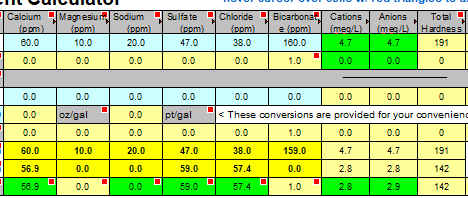Haussenbrau
Well-Known Member
I brewed a Porter yesterday and did my first cold steeping of dark drains. Below is a description of my cold steeping process
Chocolate Malt = 0.5 lb.
Roasted Barley = 0.25 lb.
Black Patent = 0.25 lb.
I used a food processor to grind the grains to a coarse coffee grind texture. I used about 0.5 gallons of 70F tap water (2:1 ratio) for the cold steep mash and let it set for about 20 hours before adding to boil at 10 minutes. I used a French press to separate the cold steep wort from the grains. I then batch sparged with one quart of tap water and repeated the French Press procedure. I ended up with 80 oz. of cold steep wort with a brix of 9.0. That calculates to a 75% efficiency. I tasted the wort and there was strong flavors from grains but no bitterness. I will post when the beer is finished to let everyone know how it turns out. The efficiency was much higher than what I expected. In the future I will plan on a longer boil to compensate for the added volume so late in the boil. I welcome all comments or questions.
Chocolate Malt = 0.5 lb.
Roasted Barley = 0.25 lb.
Black Patent = 0.25 lb.
I used a food processor to grind the grains to a coarse coffee grind texture. I used about 0.5 gallons of 70F tap water (2:1 ratio) for the cold steep mash and let it set for about 20 hours before adding to boil at 10 minutes. I used a French press to separate the cold steep wort from the grains. I then batch sparged with one quart of tap water and repeated the French Press procedure. I ended up with 80 oz. of cold steep wort with a brix of 9.0. That calculates to a 75% efficiency. I tasted the wort and there was strong flavors from grains but no bitterness. I will post when the beer is finished to let everyone know how it turns out. The efficiency was much higher than what I expected. In the future I will plan on a longer boil to compensate for the added volume so late in the boil. I welcome all comments or questions.











![Craft A Brew - Safale S-04 Dry Yeast - Fermentis - English Ale Dry Yeast - For English and American Ales and Hard Apple Ciders - Ingredients for Home Brewing - Beer Making Supplies - [1 Pack]](https://m.media-amazon.com/images/I/41fVGNh6JfL._SL500_.jpg)














































